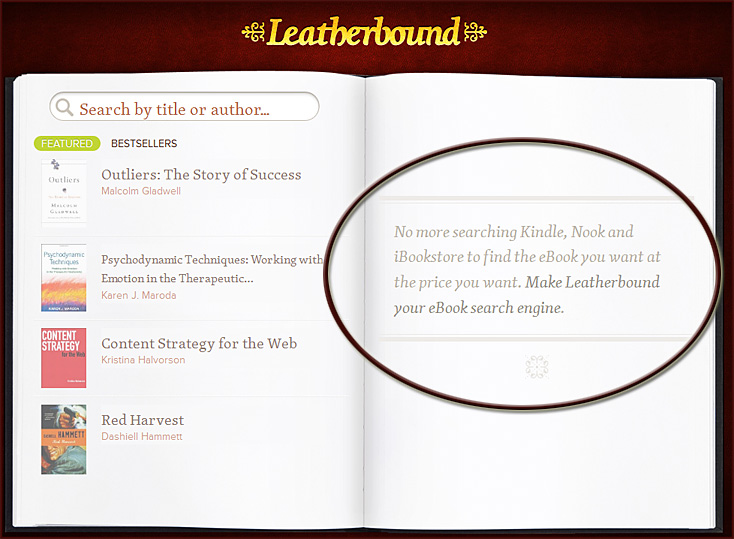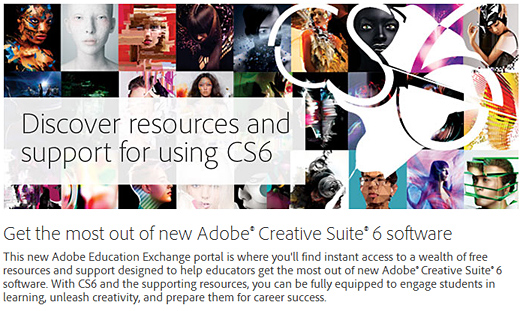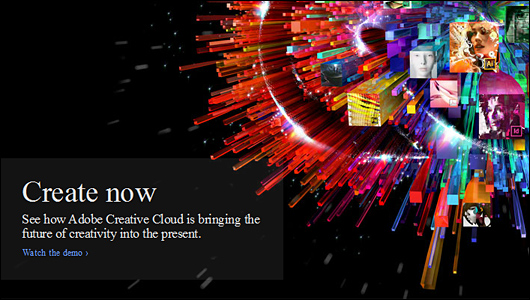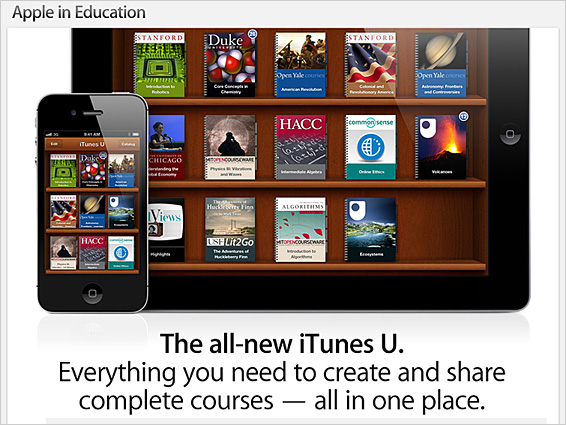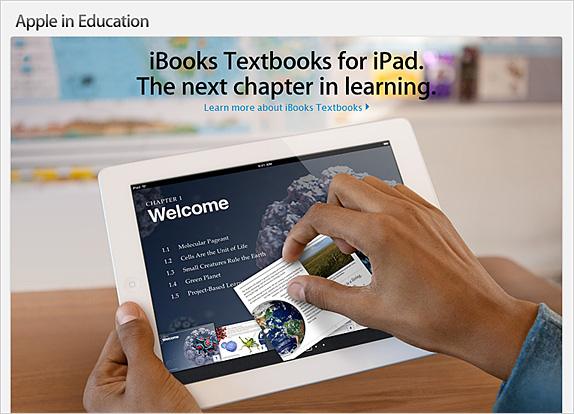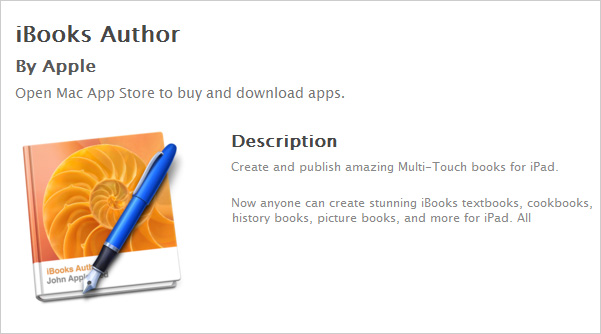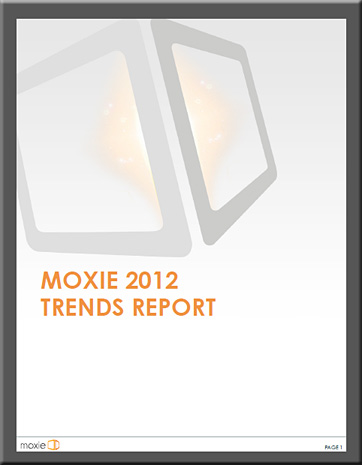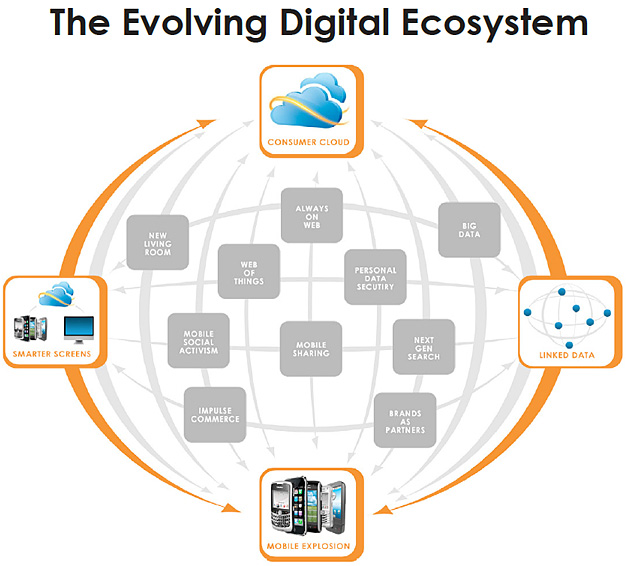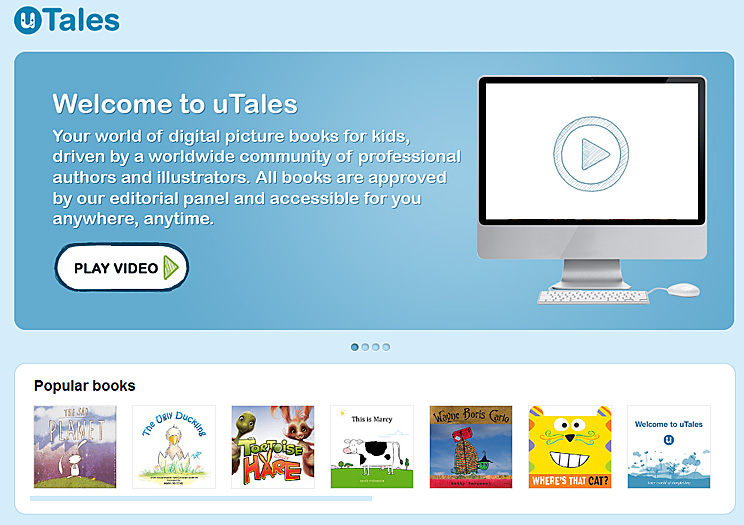From DSC:
Readers of this blog will know that I am pro-technology — at least in most areas. However, as our hearts can sometimes become hardened and our feet can sometimes find themselves on slippery ethical ground, we really need hearts, minds, and consciences that prompt us to care about other people — and to do the right thing as a result of that perspective.
Example articles that brought this to my mind recently include:
7 sinister technologies from Orwell’s 1984 that are still a threat — from dvice.com by Hal Rappaport
Excerpt (emphasis DSC):
Technology is a wonderful thing, but in the words of Spider-Man’s Uncle Ben, “With great power, comes great responsibility.” If we are not careful, the technology we know and love could be used against us, even subtly. In the year 1984, Apple thought IBM was the bringer of “Big Brother.” In reality, the technology of today better resembles George Orwell’s dystopian vision than a 1980s era PC.
Every day we are in the process of becoming a more connected society. With social networks, cloud computing and even more specific, less-thought-about tech such as Internet-connected home surveillance systems, we may find ourselves in a delicate balance of trust and paranoia.
…
While we are grateful that we don’t live in a world as bleak as Orwell’s Oceana, it’s clear that the technology now exists to make his world possible if we let it. Keeping our paranoia in check, we should all be mindful of our technology and how it’s used. Security is a good thing and so is saving money, but consider how much of each your personal freedom is worth.
Wiping away your Siri “fingerprint” — from technologyreview.com by David Talbot
Your voice can be a biometric identifier, like your fingerprint. Does Apple really have to store it on its own servers?
Excerpt:
“What I’ve discovered through building and running very targeted online ad campaigns using this data is that users respond favorably to ads that are more targeted, but only if the ads don’t make it clear that I’m targeting sensitive information about them,” he said. “What’s most interesting, and what I’m learning, are which attributes are considered too creepy, and which ones are acceptable.”
“Google Now” knows more about you than your family does – are you OK with that? — from readwriteweb.com by Mark Hachman
Excerpt (emphasis DSC):
Google Now aggregates the information Google already collects about you on a daily basis: accessing your email, your calendar, your contacts, your text messages, your location, your shopping habits, your payment history, as well as your choices in music, movies and books. It can even scan your photos and automatically identify them based on their subject, not just the file name (in the Google I/O demo, Google Now correctly found a picture of the Great Pyramid). About the only aspect of your online life that Google hasn’t apparently assimilated yet is your opinions expressed on Google+. But that’s undoubtedly coming.
Social network privacy settings compared — from techhive.com by Nick Mediati
Excerpt (emphasis DSC):
It should go without saying that protecting your privacy online is kind of a big deal. While people are generally good at not giving out their personal information to just any website that asks for it, those same people can be found filling their Facebook accounts with everything from their birthday to where they live and work. Putting this sensitive information onto a social network not only leaves your data exposed to third-parties (advertisers and so forth), but also to anyone who happens across your profile.
Facebook, Google+, and Twitter all have settings that let you tweak what others can see on your profile—but navigating them can be a bit of a mess. Not all social networks give you complete control over your privacy online, so here’s a quick overview of what Facebook, Google+, and Twitter allow you to do.
U.S. companies lost at least $13 billion to espionage last year — from ieee.org by Robert Charette
Google Glass & Now: Utopia or Dystopia? — from extremetech.com by Sebastian Anthony
Excerpt (emphasis DSC):
If you didn’t watch the Google I/O keynote presented by Vic Gundotra, Hugo Barra, and Sergey Brin, let me quickly bring you up to speed. Google Now is an Android app that uses your location, behavior history, and search history to display “just the right information at just the right time.” For example, if you regularly search for a certain sports team, Now will show you a card with the latest scores for that team. When Now predicts or detects that you’re leaving home in the morning, it will display a card with any relevant traffic information. If you have a lunch meeting in your Google Calendar, Now will show you the route you need to take to get there — and when you need to leave to get there on time. If you search Google for an airline flight, Now will show a card with the flight details (and any delays).
Big e-reader is watching you — from PaidContent.org by Laura Hazard Owen
Why privacy is big business for trial lawyers — from technologyreview.com by Antonio Regalado
Tech companies that make privacy mistakes can expect a lawsuit.

Legal discovery: The billboard is imaginary, but the trend is real.
Trial lawyers are ramping up lawsuits over online privacy breaches.
Flickr Creative Commons | AdamL212 and istock/stocknroll
- Your e-book is reading you — WSJ.com by Alexandra Alter
Digital-book publishers and retailers now know more about their readers than ever before. How that’s changing the experience of reading.
On 7/16/12:
- NIF sets record with 500 TW laser shot, lab-based nuclear fusion not far behind – — from engadget.com by Sarah Silbert
Excerpt:
NIF’s latest test shot, fired July 5th, set a new record with 192 lasers producing more than 500 trillion watts of peak power and 1.85 MJ of ultraviolet laser light. Mind you, that’s more than a thousand times more energy than the United States uses at any given moment, not to mention a hundred times more power than other lasers can fire consistently.
. - Not your typical recruiting /”now hiring” piece!
Shape the World – Aldebaran Robotics is recruiting
On 7/23/12:
- It’s Terrifying and Sickening that Microsoft Can Now Listen In on All My Skype Calls — from forbes.com by Eric Jackson
. - Facebook, Google Less Trusted Than Your Grocery Store [STUDY] by Emily Price
EBook Revenues Beat Hardcovers For The First Time — from techcrunch.com by John Biggs
Excerpt:
The Association of American Publishers released a report today that shows that ebooks have beaten hardcover revenues for the first time. Ebook revenues topped out at $282.3 million YTD while hardcovers hit $229.6. Almost exactly a year ago the tables were turned with ebooks hitting $220 million and hardcovers brushing past $335 million.
The best e-publishing resources — from Jane Friedman
Excerpt:
This week I’m teaching a 101 course on e-publishing with Writer’s Digest. I’ve taught it several times in the past year, but each time, I have to carefully update it. New services pop up, standards change, and things you couldn’t do before suddenly become possible—and vice versa. It can be a challenge even for me to keep up.
With that in mind, I thought I’d share what I consider the must trusted resources on e-books and e-publishing. If you think I’ve missed a critical resource, please let me know in the comments.
.
.Also see:
- The Global Creativity Gap — an infographic from Adobe
.
. -

Pantone unveils 336 new colors — from PSFK.com by Kyana Gordon
-
Education system stifles creativity, survey finds — from The Journal by David Nagel
Is the American education system stifling creativity? That’s the attitude held by a majority of Americans, according to a new worldwide survey focused on attitudes toward creativity in schools, the workplace, and the home.
From DSC:
- This last piece from David Nagel addresses my fears and concerns with our current emphasis on standardized tests, common core standards, etc. The emphasis is on STEM and can lead to a one-size-fits-all type of education that doesn’t allow each student to identify and pursue their own passions enough.
Addendum on 5/2/12:
- Adobe Dreamweaver CS6 — reviewed at PCMag.com
.
Groundbreaking tools for creating e-books — from Jane Friedman
Excerpt:
The past year has seen tremendous progress and growth in e-book creation and distribution services. Here are the most notable and impressive that I’ve seen.
Are apps the future of book publishing? — from forbes.com by Alex Knapp
Excerpt:
It’s no surprise, then, that publishers are turning to the app as a possible product for books moving forward. This has led to another movement towards enhanced books, particularly as apps for iPhone, Android, and other tablets. Are tablet apps the book of the future? In order to find out, I talked to authors, publishers, and app programmers, and read more than a few book apps.

Via:
Accredited Online Universities Guide
Addendum on 2/14/12 — also see:
- Textbooks Redefined –– from inkling.com
NBC News launches interactive e-book publishing venture — from pcmag.com by Adario Strange
Excerpt:
NBC News plans to launch NBC Publishing, a venture dedicated to releasing interactive e-books for tablets and e-readers.
Tablet and e-book reader ownership nearly double over the holiday gift-giving period — from Pew Internet by Lee Rainie
Apple to announce tools, platform to “digitally destroy” textbook publishing –– by Chris Foresman
Excerpt:
GarageBand for e-books
At the same time, however, authoring standards-compliant e-books (despite some promises to the contrary) is not as simple as running a Word document of a manuscript through a filter. The current state of software tools continues to frustrate authors and publishers alike, with several authors telling Ars that they wish Apple or some other vendor would make a simple app that makes the process as easy as creating a song in GarageBand.
Our sources say Apple will announce such a tool on Thursday.
Some thoughts/reflections from DSC:
- If the educational publishing industry doesn’t want to help students out by greatly lowering their prices…
(But don’t relax people in higher ed…most likely, we are next.)
.
- Another example of “the dangers of the status quo.“
. - We constantly need to be actively reinventing ourselves and our businesses so that we are staying relevant.
(And at prices running up to and over $200,000 for 4 years of college — as of January 2012 — the assertion that higher ed is not a business just doesn’t hold any water for me anymore.)
.
Addendum later on 1/17/12:
- 5 Digital Publishing App Trends to Watch in 2012 — by Erik Loehfelm
Why tablet publishing is poised to revolutionize higher education — from Mashable.com by Trevor Bailey
Excerpt (emphasis DSC):
Richer than their print counterparts, digital textbooks include a number of interactive features. They are not limited to static pictures, but can integrate video, audio, animation, interactive simulations and even 360-degree rotations and panoramas. In addition, universities have the ability to create custom, institutionally branded viewers with unique displays and navigation options.
…
Digital publishing allows professors or subject matter experts to self-publish their own educational materials or research findings and distribute the information on tablet devices. Teachers can iterate content quickly, better keeping pace in a world where knowledge evolves every instant. On a smaller scale, they can post lesson documents online for students, versus relying on hard-copy materials.
From DSC:
…and we’ll see what Apple says about this topic later this month; 2012 should be an interesting year indeed. I would like to see more of our professors’ e-books/self-published materials up on the Chalkboard of the Future:
.
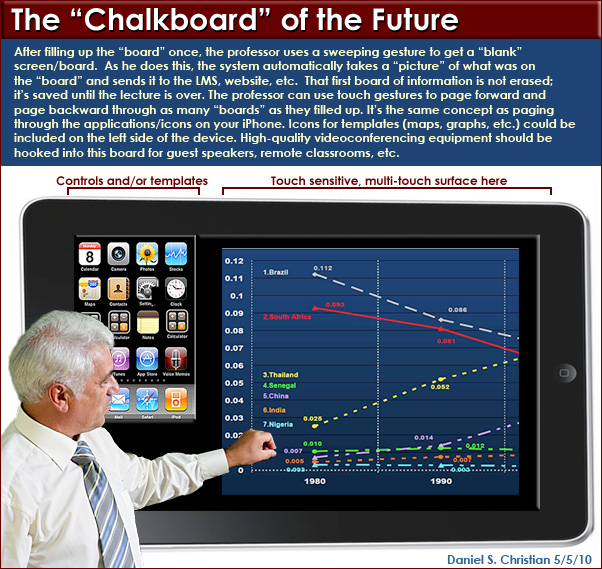
![]()
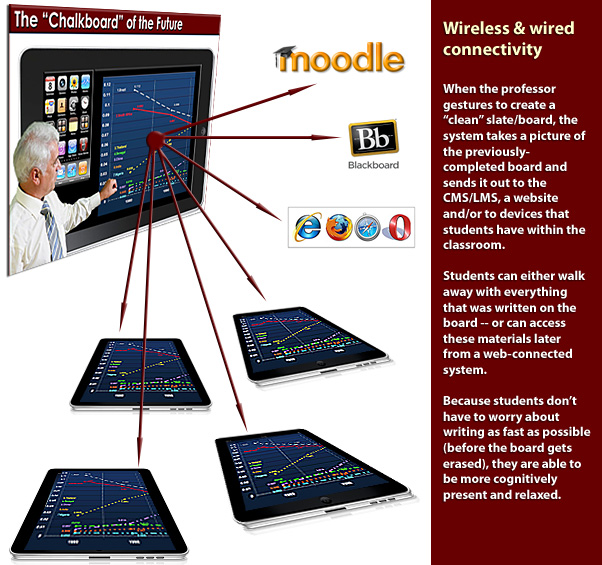
.
.
- The Always On Web
- Web of Things
- Big Data
- Next Gen Search
- Mobile Sharing
- Mobile Social Activism
- Impulse Commerce
- Brands As Partners
- The New Living Room <– From DSC: This is one of those key areas that I’m trying to keep a pulse check on for re: our learning ecosystems of the future
- Personal Data Security
Also see:
- 3 trends for 2012 — from digitaltonto.com by Greg Satell
- What trended in 2011 (and what to expect from 2012) — from techi.com by Scarlett Madison
- uTales: Crowdsourcing Children’s Book Publishing — from wired.com by Daniel Donahoo









